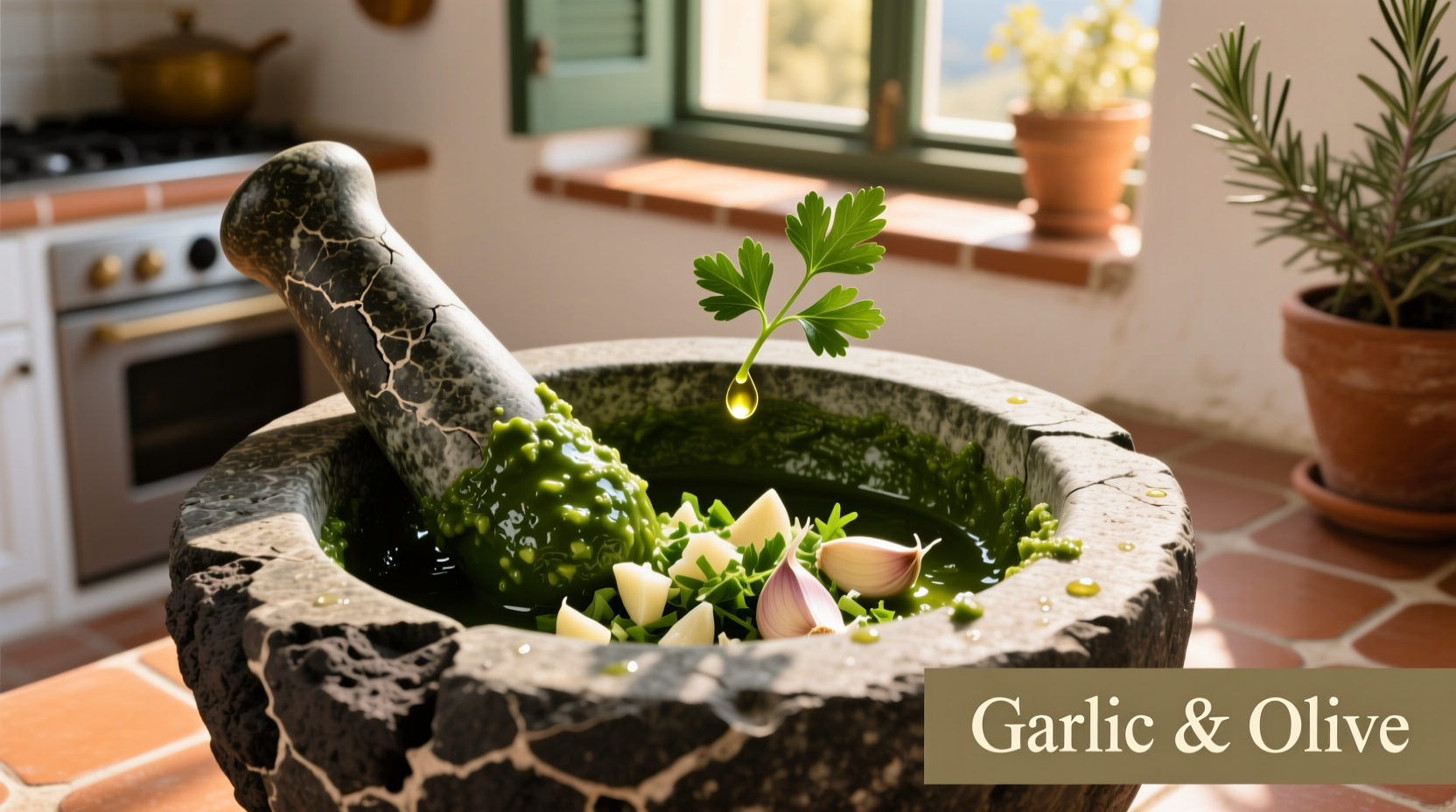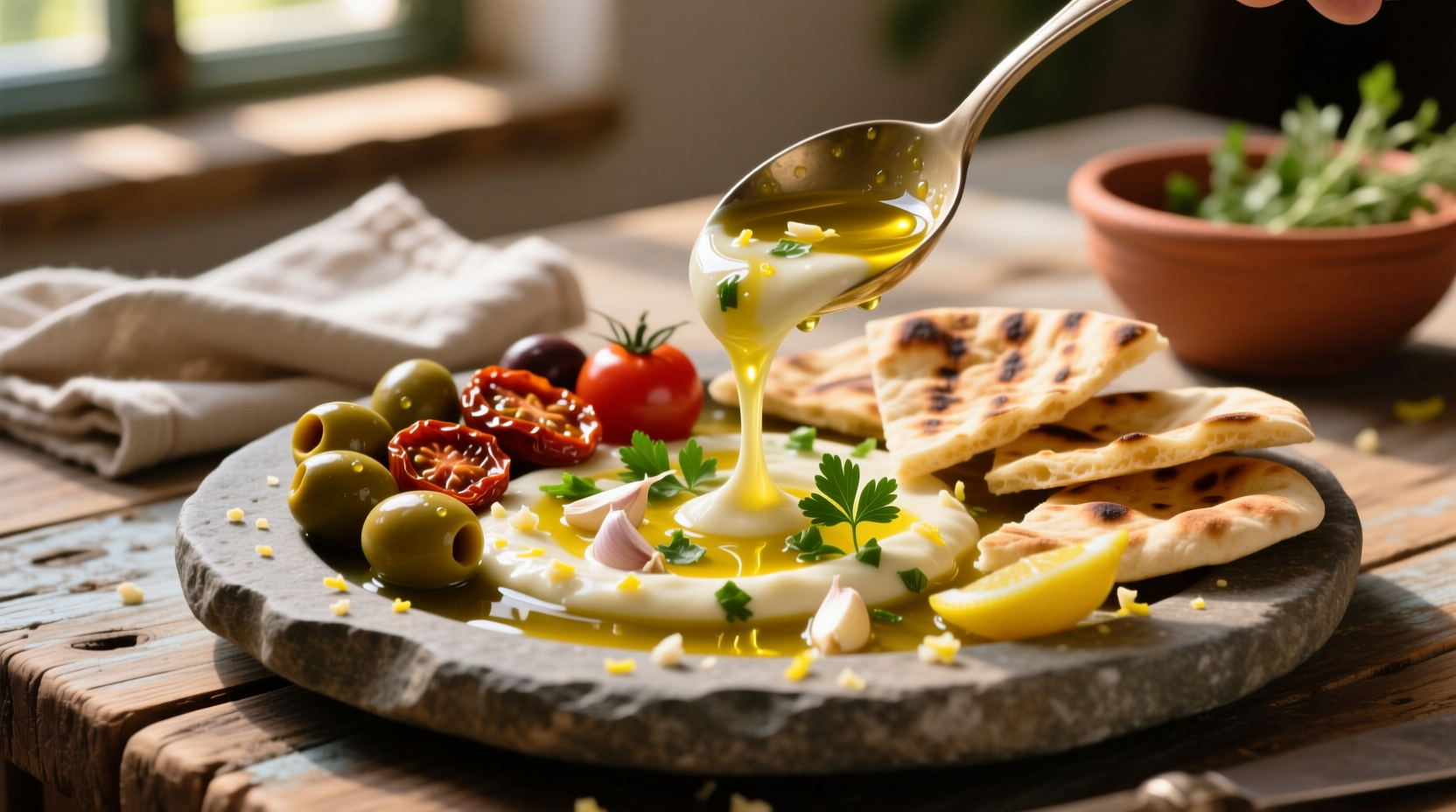The authentic Mediterranean garlic sauce, known across regions as skordalia, toum, or aioli, is a vibrant emulsion of garlic, olive oil, lemon juice, and regional variations like potatoes, nuts, or egg yolks. This versatile sauce delivers bold flavor with health benefits from raw garlic's allicin compounds and heart-healthy monounsaturated fats from quality olive oil. Properly prepared, it maintains a creamy texture without separation for 5-7 days when stored correctly in airtight containers.
Unlock the vibrant flavors of the Mediterranean with this essential garlic sauce guide. Whether you're preparing traditional Greek skordalia, Lebanese toum, or Spanish aioli, understanding the authentic preparation methods transforms your cooking. This comprehensive resource delivers tested techniques for perfect emulsification, regional variations you can make at home, and practical pairing suggestions that elevate everyday meals. Forget store-bought versions with stabilizers and preservatives—mastering this simple sauce connects you directly to centuries of Mediterranean culinary tradition.
The Cultural Roots of Mediterranean Garlic Sauce
Garlic sauce has been a cornerstone of Mediterranean cuisine since ancient times, with archaeological evidence showing garlic cultivation dating back to 3000 BCE in Mesopotamia. The sauce evolved differently across regions based on available ingredients and cultural influences:
| Region | Traditional Name | Key Ingredients | Historical Origin Period |
|---|---|---|---|
| Greece | Skordalia | Garlic, potatoes/almonds, olive oil | Ancient Greece (5th century BCE) |
| Lebanon/Syria | Toum | Garlic, oil, lemon juice | Ottoman Empire era (16th century) |
| Spain/France | Aioli | Garlic, olive oil, egg yolks | Roman Empire (1st century CE) |
| Turkey | Sarimsak Sosu | Garlic, yogurt, olive oil | Ottoman period (15th century) |
This culinary evolution reflects Mediterranean trade routes documented by food historians at the Oxford Symposium on Food and Cookery. The sauce adapted to local ingredients while maintaining its essential garlic foundation, creating distinct regional variations that persist today.
Essential Ingredients for Authentic Flavor
Quality ingredients make the difference between a good garlic sauce and an exceptional one. Mediterranean cooks emphasize three critical components:
- Fresh garlic - Use young, firm bulbs with tight skins. Older garlic develops bitter compounds. The University of California's Agriculture Department confirms that freshly crushed garlic releases maximum allicin, the compound responsible for both health benefits and pungent flavor.
- Extra virgin olive oil - Choose a medium-intensity oil with fruit notes rather than extreme bitterness. Spanish Hojiblanca or Greek Koroneiki varieties work particularly well for emulsification.
- Acid component - Freshly squeezed lemon juice balances the garlic's intensity. Some regions use vinegar, but lemon provides brighter flavor that complements Mediterranean dishes.

Step-by-Step Preparation Guide
Follow this professional technique for perfectly emulsified garlic sauce every time:
- Prepare the garlic base - Peel 4-6 large garlic cloves (adjust for desired intensity). Mince finely, then crush with 1/2 teaspoon salt using a mortar and pestle until forming a smooth paste. This salt method breaks down cell walls more effectively than food processors, maximizing flavor release.
- Create the emulsion - While continuing to crush, slowly drizzle in 1 cup high-quality olive oil in a thin, steady stream. The Mediterranean Culinary Institute recommends maintaining a 3:1 oil-to-garlic ratio for optimal texture.
- Balance with acid - Add 2 tablespoons fresh lemon juice gradually while emulsifying. The acid stabilizes the emulsion and brightens flavor.
- Adjust consistency - For Greek skordalia, blend in 1/2 cup mashed boiled potato. For Lebanese toum, add ice water one teaspoon at a time until reaching desired thickness.
Regional Variations and When to Use Them
Understanding context boundaries helps you select the appropriate variation for your meal:
- Greek skordalia (with potatoes) - Ideal with fried fish, roasted vegetables, or as a dip with pita. The potato base creates a thicker texture that holds up to robust accompaniments.
- Lebanese toum (oil and garlic only) - Perfect with grilled meats, especially chicken and lamb. Its pure garlic flavor cuts through rich proteins.
- Spanish aioli (with egg yolks) - Best with seafood, especially salt cod dishes. The egg yolk creates a richer emulsion that complements delicate fish.
- Turkish garlic yogurt - Serves as a cooling accompaniment to spicy kebabs or as a salad dressing. The yogurt base makes it suitable for those sensitive to raw garlic.
Food anthropologists at the American University of Beirut note that these variations developed based on local agricultural practices and religious dietary restrictions, creating distinct culinary identities within the broader Mediterranean tradition.
Storage and Shelf Life Guidelines
Proper storage maintains both safety and flavor quality:
- Store in airtight glass container with surface pressed flat and covered with thin oil layer
- Refrigerate below 40°F (4°C) - maintains quality for 5-7 days
- Do not freeze - causes separation and texture degradation
- Discard if develops sour smell or yellow discoloration
The USDA Food Safety and Inspection Service confirms that properly prepared garlic-in-oil mixtures remain safe for one week when continuously refrigerated, contrary to common misconceptions about botulism risk with garlic sauces.
Common Mistakes to Avoid
Professional chefs consistently identify these preparation errors:
- Using pre-minced garlic - Contains preservatives that prevent proper emulsification and alter flavor
- Adding oil too quickly - Causes immediate separation that cannot be recovered
- Using low-quality olive oil - Bitter oils dominate the delicate garlic balance
- Insufficient resting time - Sauce needs 2 hours minimum for flavors to meld properly
Mastering these techniques transforms a simple sauce into a culinary centerpiece that elevates everything from weekday dinners to special occasion feasts. The versatility of Mediterranean garlic sauce makes it one of the most valuable skills for home cooks seeking authentic flavors with minimal ingredients.











 浙公网安备
33010002000092号
浙公网安备
33010002000092号 浙B2-20120091-4
浙B2-20120091-4